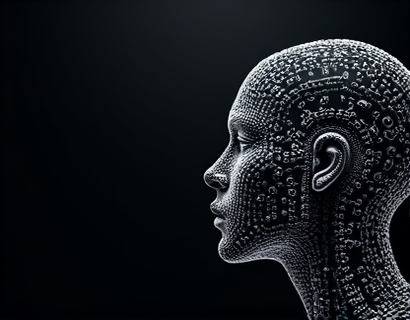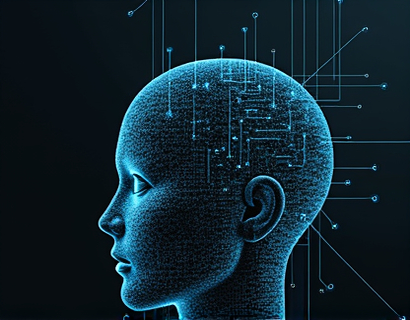Maximizing User Engagement in the Digital Age: Harnessing AI and Crypto for Next-Gen Marketing Solutions
The digital landscape is evolving at an unprecedented pace, driven by technological advancements and changing consumer behaviors. In this dynamic environment, businesses and marketers are constantly seeking innovative ways to enhance user engagement and drive growth. One of the most promising avenues for achieving these goals is the integration of Artificial Intelligence (AI) and blockchain technology, commonly referred to as crypto. This article delves into how these cutting-edge technologies can be harnessed to create next-generation marketing solutions that not only boost user engagement but also foster a more secure and transparent digital experience.
Understanding the Synergy Between AI and Crypto
AI and crypto may seem like disparate technologies, but their convergence holds immense potential. AI, with its ability to analyze vast amounts of data, learn from patterns, and make predictions, can significantly enhance marketing strategies. On the other hand, crypto, through its decentralized and secure nature, offers a new paradigm for data management and user interactions. When combined, these technologies can create a powerful synergy that transforms how brands connect with their audiences.
Enhanced Personalization Through AI
One of the most impactful applications of AI in marketing is personalized user experiences. By leveraging machine learning algorithms, marketers can analyze user behavior, preferences, and interactions to deliver highly tailored content and offers. This level of personalization not only increases user engagement but also enhances customer satisfaction and loyalty. For instance, AI-driven recommendation systems can suggest products or services based on a user's browsing history and purchase behavior, making the shopping experience more relevant and engaging.
Moreover, AI can predict user needs and behaviors before they even occur. Predictive analytics, a subset of AI, uses historical data to forecast future trends and actions. This proactive approach allows marketers to stay ahead of the curve, anticipating user demands and adjusting their strategies accordingly. Personalized content, dynamic pricing, and targeted advertising are just a few examples of how AI-driven personalization can elevate the user experience and drive engagement.
Transparency and Trust with Blockchain
Trust is a critical component of user engagement. In an era where data breaches and privacy concerns are rampant, users are increasingly wary of sharing their information. Blockchain technology addresses these concerns by providing a transparent and secure way to manage data. The decentralized nature of blockchain ensures that data is not controlled by a single entity, reducing the risk of misuse and enhancing user trust.
In the context of marketing, blockchain can be used to create immutable records of user interactions and preferences. This transparency not only builds trust but also gives users more control over their data. For example, a blockchain-based loyalty program can ensure that rewards are accurately tracked and distributed, without the risk of tampering. Users can verify their points and rewards on a public ledger, fostering a sense of fairness and reliability.
Decentralized Marketing Networks
The combination of AI and blockchain can lead to the creation of decentralized marketing networks, where users are active participants rather than passive recipients. These networks leverage blockchain to create tokenized economies, where users can earn and trade tokens based on their engagement and contributions. AI can optimize these networks by analyzing user behavior to allocate tokens and rewards effectively, ensuring that the most engaged users are incentivized appropriately.
Decentralized autonomous organizations (DAOs) are another innovative application of this synergy. DAOs use smart contracts to govern marketing campaigns and community initiatives, allowing for transparent and democratic decision-making. AI can enhance DAOs by providing data-driven insights and automating routine tasks, enabling the community to focus on strategic growth and engagement.
Enhancing Security Through Cryptographic Techniques
Security is a paramount concern in digital marketing. Cryptographic techniques inherent to blockchain technology offer robust security measures that protect user data and ensure the integrity of marketing processes. By using cryptographic hashes and digital signatures, sensitive information can be securely stored and transmitted, minimizing the risk of breaches and fraud.
AI can complement these security measures by detecting and mitigating potential threats in real-time. Machine learning algorithms can analyze patterns in user behavior to identify anomalies that may indicate malicious activity. This proactive approach to security not only protects user data but also maintains the trust and engagement of the audience.
Dynamic Content Creation and Delivery
AI-powered content creation is revolutionizing the way brands interact with their audiences. By generating high-quality, contextually relevant content at scale, AI can help marketers maintain a consistent and engaging presence across various platforms. This is particularly useful in creating personalized messages that resonate with individual users, further enhancing engagement.
Blockchain can take content creation and delivery to the next level by ensuring the authenticity and ownership of digital assets. NFTs (Non-Fungible Tokens) can be used to represent unique digital content, providing creators with a way to monetize their work and users with a means to own and trade exclusive content. AI can optimize the distribution of these NFTs, ensuring that they reach the right audience at the right time, thereby maximizing engagement and value.
Real-World Applications and Case Studies
Several companies have already begun to explore the potential of AI and blockchain in marketing. For instance, a leading fashion brand implemented an AI-driven chatbot on its blockchain-based platform to provide personalized shopping advice and recommendations. The chatbot not only enhanced user engagement but also drove sales by offering tailored product suggestions based on user preferences and purchase history.
Another example is a music streaming service that used blockchain to create a tokenized loyalty program. Users earned tokens for streaming songs, attending events, and engaging with the community. These tokens could be redeemed for exclusive content and merchandise. AI was used to analyze user behavior and optimize the distribution of tokens, ensuring that the most active and loyal users were rewarded appropriately.
Challenges and Considerations
While the potential of AI and blockchain in marketing is vast, there are several challenges and considerations that must be addressed. One of the primary challenges is the technical complexity involved in integrating these technologies. Marketers and businesses need to invest in skilled personnel and infrastructure to harness the full potential of AI and blockchain.
Regulatory compliance is another critical aspect. As blockchain and AI are relatively new fields, the regulatory landscape is still evolving. Marketers must ensure that their use of these technologies complies with local and international laws, particularly those related to data privacy and security.
Additionally, there is a need for education and awareness among both marketers and users. Understanding the benefits and capabilities of AI and blockchain is essential for effective implementation and adoption. Providing training and resources can help bridge the knowledge gap and foster a more informed and engaged community.
Future Trends and Opportunities
The intersection of AI and blockchain is just beginning to unfold, and the future holds numerous exciting opportunities. As these technologies continue to mature, we can expect to see more sophisticated and seamless integrations in marketing and beyond. For instance, the development of interoperable blockchain networks will enable more fluid and efficient cross-platform interactions, enhancing the user experience across different digital touchpoints.
AI-driven virtual assistants and chatbots powered by blockchain can become ubiquitous, providing users with personalized and secure interactions. The rise of metaverse and virtual reality (VR) environments presents another frontier where AI and blockchain can create immersive and engaging experiences, further transforming marketing strategies.
In conclusion, the combination of AI and blockchain offers a powerful toolkit for marketers looking to maximize user engagement and drive growth in the digital age. By leveraging these technologies, businesses can create more personalized, secure, and transparent experiences that resonate with today's tech-savvy and discerning audience. As the landscape continues to evolve, embracing these innovations will be key to staying ahead of the competition and achieving long-term success.










































